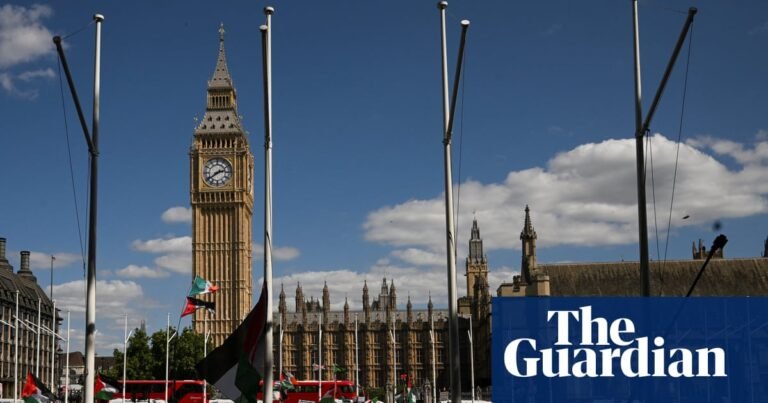The co-founder of Palestine Action has accused ministers of making false and defamatory allegations about the banned group and contradicting their own intelligence assessments in an attempt to justify the arrest of more than 500 people.
The government has come under pressure to justify the detention of 532 people arrested over the weekend under the Terrorism Act – half of whom were 60 or older – on suspicion of showing support for Palestine Action.
The number of people arrested for peaceful protests, together with the images of older people being led away and the demands placed on the criminal justice system have led many to call into question the criminalisation of so many people.
On Monday, a Downing Street spokesperson responded by saying that Palestine Action, which last month became the first direct action protest group to be banned, was “a violent organisation that has committed violence, significant injury, extensive criminal damage”.
The home secretary, Yvette Cooper, told the BBC that Palestine Action “is not a non-violent organisation” and claimed that court restrictions meant people “don’t know the full nature of this organisation”.
But Huda Ammori, co-founder of Palestine Action, said: “Yvette Cooper and No 10’s claim that Palestine Action is a violent organisation is false and defamatory and even disproven by the government’s own intelligence assessment of Palestine Action’s activities …
“It was revealed in court during my ongoing legal challenge to the ban that the Joint Terrorism Analysis Centre’s (JTAC’S) assessment acknowledges that ‘Palestine Action does not advocate for violence against persons’ and that the ‘majority’ of its activities ‘would not be classified as terrorism’.
“Spraying red paint on war planes is not terrorism. Disrupting Israel’s largest weapons manufacturer, Elbit Systems, by trespassing on their sites in Britain is not terrorism. It is the Israeli Defense Forces and all those who arm and enable their war crimes who are the terrorists.”
JTAC, a government body based within MI5, produced a secret report on 7 March which was disclosed in the high court. While recommending banning Palestine Action, JTAC said the group “primarily uses direct action tactics”, which typically resulted in minor damage to property. “Common tactics include graffiti, petty vandalism, occupation and lock-ons,” it added.
Defend Our Juries, which has organised multiple demonstrations, including Saturday’s, in support of Palestine Action, also highlighted Whitehall officials’ description – again in documents revealed in court – of a ban as “relatively novel” as “there was no known precedent of an organisation being proscribed on the basis that it was concerned in terrorism mainly due to its use or threat of action involving serious damage to property”.
A Defend Our Juries spokesperson said: “It is despicable that under political pressure, Yvette Cooper is now actively misleading the British public about the nature of Palestine Action, knowing that if people come to their defence to counter her disinformation, she can have them jailed for 14 years [because they could be deemed to supporting a proscribed group].”
The group said many hundreds of people had already committed to the next protest, which is likely to take place in early September and will be on an even larger scale.
Uncertainty remains over the status of charges and prosecutions. Tom Franklin, chief executive of the Magistrates’ Association, said: “Based on the information that we currently have, and the statement put out by the Metropolitan Police yesterday, it could take days and possibly weeks for decisions to be made on whether or not to charge any of those arrested over the weekend. Many of these cases may also be heard in the crown courts, rather than magistrates courts.”
Magistrates courts hear less serious cases although some charges under section 13 of the Terrorism Act are “either way”, meaning the defendant can choose whether to be tried before magistrates or a jury in the crown court.
The Defend Our Juries spokesperson said: “Personally I would go to the crown court because I know where the British public is, both on the genocide in Gaza and secondly on the British government’s support for it, and thirdly on people not being allowed to express their opinions.”
However, they added that they expected most charges to be laid under section 13, which are all heard in the magistrates courts, as the criminal justice system would not be able to cope with so many jury trials.


